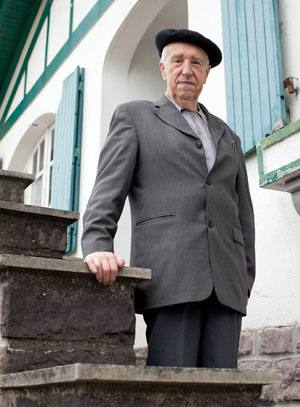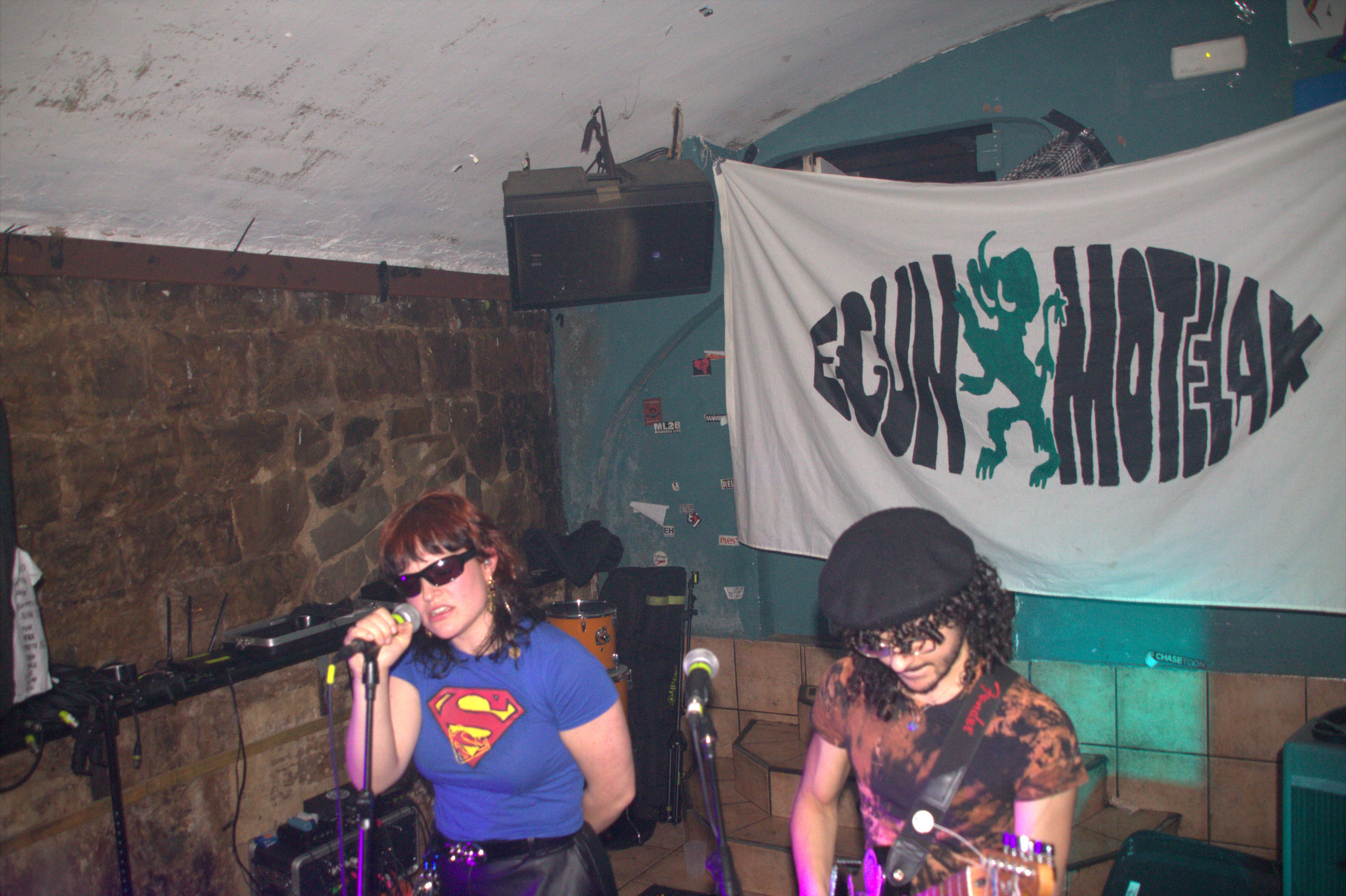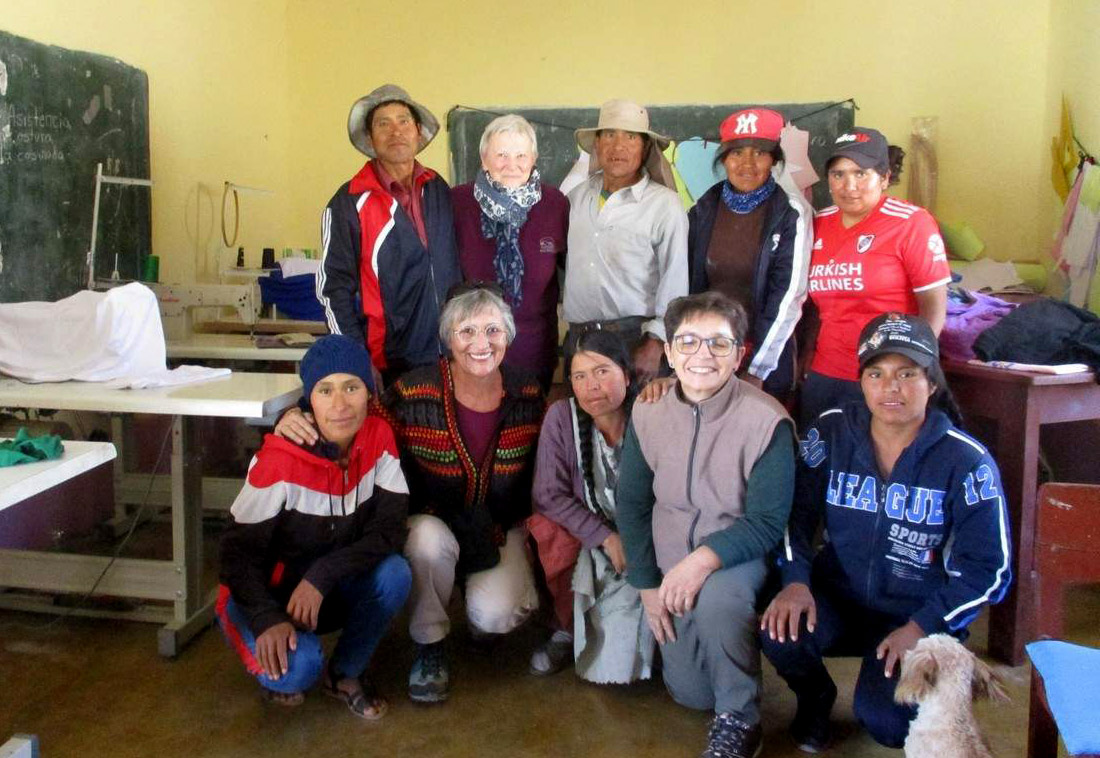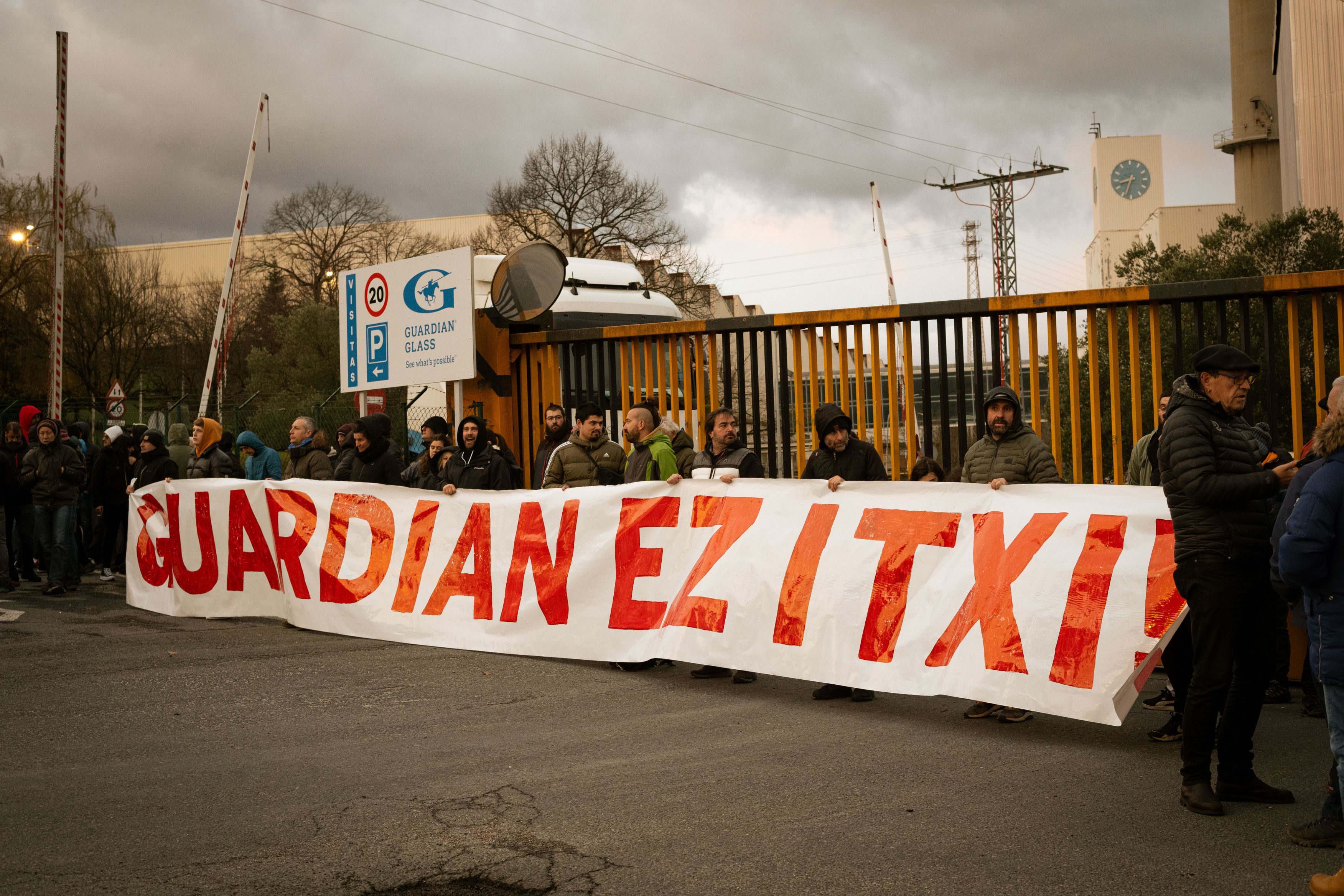"I am more optimistic about Euskera than I am about faith"
- Priest, director of the Semanario Herria, academic of Euskaltzaindia, writer… Emile Larre has done a lot of work and one more. Piarres Lafitte, Piarres Larzabal, Teodoro Hernando… A world that has lived almost a century. Living history in the Basque Country.

“Emile Larre has been a shadow worker. His name has never been in the foreground, but he has worked hard in his life and has participated in a multitude of enrichments of Basque culture and language.” What Eneko Bidegain says in her Bidegile booklet of you. That is what has brought us to you.
That's my world, yes, culture and language. I have always been Euskaldun, raised in an Euskaldun atmosphere. I went to the junior seminary at the age of 11, and the letters I sent home we always did in Euskera, both my mother and I. My mother knew it, and I knew it. At home, on the other hand, we were always talking about Euskera. In Baigorri we were farmers, Basques, and when I started in the cure, there we also spent half, and less than half of the other half, the harnesses. The Basques had a club like ours, a ball and a writing club. We had a notebook that we would go hand in hand and there each one would do an article and pass it on to the other. Always in Euskera us. I was lucky at the seminary, because I was lucky enough to be a professor at Lafitte.
I thought Lafitte spoke French, not Basque…
Lafitte was a French teacher and, like all other teachers, spoke French in all schools and in all schools. However, Lafitte invented for himself an apartment school to teach Euskera. But out of their job. By then he was director of the journal Herria, apart from his works, and he already had so much or more work than all the other professors! He also spoke in Basque. Then, when I have become a Vicar, always in the Basque villages, there I have done it as Lafitte, I wanted the Basque more, I spoke easier in Basque. I've always had it. Later, when I was 40 years old, he asked me to go to the People. I've never had a position for the Basque Country, like Lafitte. I've done that job, not always paid.
When Lafitte asked him to run the village, you placed the condition on him.
Did you know? I knew that the people were going wrong when it comes to money. Things were really bad, "You can't go on! I told Lafitte. We both stayed in total darkness during the night. It was Labegerie's women's funeral day. I took Lafitte in Uztaritze and took her to Kanbo, and then I went back to Uztaritze. Lafitte said: “We will do what we can and as long as we can!” I came to the house and thought, "Lafitte can't leave it that way! and I called him. “I will try.”
You just mentioned my mother, not my father. Where was your father?
My father was there, too. But the mother does the letters, the letters. My father sufficed with the work of the house. My father was a good worker, he used the property well. It was the work of their wives to write! It was the task of the wives to go to do recades, to do commissioners, to buy what they needed... The father went to the market, if there was something, or to correct the papers... Also the vegetable garden, the mother, unless the land had to be returned or something had to be done. The men landed, buried the cows, took the remains to the field or to the field… The women’s jobs and the men’s jobs!
Are they like that now too?
No, no, no. That is not the case. For the first time I saw my brother accompanying my wife. When my wife had dinnerware to do, I've seen my brother cleaning up the mattress and the dishes. My father didn't. It wasn't like that in her father's time. Do you know, at your father's time, who was drying the straws? Me. I was a seminarian and I was walking through my workplace.
The crop you love…
Yes, yes, yes. Until I was 25, I worked in summer with my family. The holidays would come on the first of July, and until the first of October, at three months, always working at home. There were summer colonies then, but I wasn't free, I needed it at home, because I was poor worker and I wanted it. All my holidays I've spent at home. This is how I relate to the peasant world.
Anyway, you were a cure.
And my father and mother have never bothered me! They have seen my homeland with good eyes, but they have not bothered me so far, they have not heated my head so as not to make me a priest. I had picked up this thought from myself, from catechesis, and I don't know where. My father said to me: "You'll make a Banka pastor with a couple of cows! ". With a couple of cows, though! I liked cures as well as cereals.
The Minor Seminary of Uztaritze, first of all, after that of Baiona. The first seed of nationalism germinated…
On the Easter holidays there was a youth movement, among us, 15-16 years of age, and we met at the Uztaritze seminary to speak in Basque. There have been members of the St. Bernard College in Baiona and some of the liceo. And there I have met Ximun Haran, perhaps the physician Monleon, the Intxauspiak – Mixel and Nikola… They were not cures in schools, they were not Christian, with all of them we have been there, we talked about Euskal Herria, in Basque… I remember, we used an amazing chapita with Intxauspe, not with Nikola. “On peut etre basque sans savoir le basque!” (could be Basque without knowing Basque! ). Nikola was very easy, he released a big pepper -- so happy that we would have an idea that wouldn't have been entirely.
There's still one question. Can there be someone who is Euskaldun without knowing Euskera?
There is always disgrace. It may not be possible in theory, but it is in reality. How do you explain to me what concerns us? “Publish the Basque!” What for? You know Basque… and he in Spanish! It is not, however, a present evil. It's a disease that lasts a long time! In that youth movement, another was the pelotaris movement. Beast De Oiartzabal de Sara, Fagoaga – doctor and Paul –, Larronde – who died in accident at age 40 – were big pelotaris, a long team – bounce, if you like – set up with Ximun Haran in 19-20 years and proclaimed champions against the best of then. At the same time, they launched nationalism. They were Ximun Haran.
In 1951, a priest was ordered and Hazparne went away. It happened to Piarres Larzabal.
I've been so lucky. I've been with Piarres Larzabal. It was not his subject, but he had to remain in office. Larzabal goes from Hazparne to the parish priest of Socoa. And I, later, vicarious to Urruña. We were in five kilometres, and every Monday we had exits – to the south, of course – I had a motorbike, Larzabal did not. Walking with Lafitte, with Larzabal, with a year in Zuberoa and besides meeting her... with incredible luck. Then, as the Basque wanted and I started a bit with Lafitte, I directed Herria and with her I have traveled all over Euskal Herria. Here I have been a missionary, but of the interior, not of Africa, of America and so on, and I have preached in all the peoples of Iparralde. Those have helped me walk around the world.
Why not missionary abroad?
I had never shown that calling, but I could be. It could not be. What years were they? In 64-65 or something like that, the Pope asked. There was a poor priest in Africa and a lot of vocations. I had asked priests all over the world to spend three years, or six, on a tour of Africa. Many of my friends have done so. Why not? Hiriart Urruty is the culprit, my great friend. He or I had to make the sacrifice. Hiriart Urruty was director of Urruty Herria, but before he was a professor at the seminary. There were some conflicts between the teachers and there was also Monsignor Ouzet and some others. At the seminar were Manex Pagola, Gexan Lantziri, Borda, Sarasola de Urruña… The four were part of nationalism and Ariztia led the grand seminar. Ariztia was a carlist – you can say so – hard, and he didn’t have the sweetness, the skill enough to understand the young. These four seminarians had hardened and left, just as two teachers, Uzet and Hiriart Urruty, had left. They had another post, but they left the seminar. Hiriart Urruty has had one post, and then another, and he's signed up for Africa, but obviously it was to escape the scenes here. Before I left and before Lafitte told me, Hiriart Urruty has asked me to run the village. She went to Africa, I was always here, because the people were always there. I have been leading him for thirty-four years.
You've known the world of theater with Piarres Larzabal, then Bertsolarism.
He in Sokoa, I in Urruña, was going to see him when we had to do theater, or this and that. We've walked a lot together, and as one learns the other, so I've also known the world of the Bertsolaris, and the world of Teodoro Hernando. He came to Urruña and we did the bertsolaris championship. There were three hundred people on the spot. The accommodation in Urruña was filled. Hernandorena had conquered the whole South, and from there he had brought the world. Also for the north, but much more for the south. I entered the world of the bertsolaris and walking with them also a bit of bertsos (he has taught us a lot of papers, verses and songs, written by him), always singing, and also in the church.
You've been sworn in the Bertsolaris Championship.
The championship was organized by Euskaltzaindia. There were twelve members of the jury, where two of Iparralde's were needed. They were Lafitte and Labeguerie. But Labeguerie, then, was starting to get into politics and couldn't go. Lafitte, not a single teacher, not a single car, came to me and Mixel Itzaina. “You both have to occupy our site.” I've been part of all jurors. They have brought us in. We did not have the technique of others, nor the experience, nor the precision… but at least two were needed in Iparralde. We have learned, walking, and with Fernando Artola Bordari, Dionisio Amundarain, and Joanito Dorronsoro…
Priest, labrador, assistant in theatre and in verse, director of Herria, writer, author of many manuscripts, academic of Euskaltzaindia…
I never had a method, but I've always lived in this world. It's been my experience. In Euskaltzaindia, I'm also the worst of all, I don't know how to theorize. I write what I write, I will write it in a very low voice. They've confused the whole North with him.
There, too, in the South…
No, the people there don't know, but the Iparralde people have been wrong listening to the people there! They should not confuse it, they were content to speak their father’s Basque! I've been in what I've had. These are small things, that is not going to make the Basque fall. I'm starting to be optimistic about the future of Euskera. My good friend Iratzeder also said this in Beloki: “Euskera and faith”. I also told the bishop of Baiona this week: “If, for example, Euskera will not be saved better than faith, yet.” In these difficult days, I see faith in a great danger, as if the Basque were almost being saved. I am more optimistic about Euskera than I am about faith. I do not speak as a believer, because I must not hesitate as a believer, but I say that realism. At least in the Basque Country.
I don't know. I've come to Garazi, and I didn't know where your house was, Larrazkena, I've asked for it there, here and there, and no one has understood my word "egunon," except the postman.
Woman? He's a very decent guy. Suppose you've fallen ill. But there are three villages, three streets, Donibane Garazi, Ezpeleta, Donapaleu, and the fourth, Maule, that are at risk of losing Euskera. I have just told him that faith is in danger, the Basque is translating better. A few years ago, I wouldn't believe that my father or my brother would also accept, learn Euskera to do a trade for the future. And my nephew has picked it up. My brother says: “The Basque Country continues to lose.” I'm not too brother. My experience teaches me that the bishop of Baiona also tries to pull. The Basque name has a great shadow, whether you like it or not. Commercially, and in terms of population, it has a huge influence. That's a tough thing, and it doesn't take away. We thought it was going to be lost, but, in my opinion, the Basque is being saved.
Okzitaniako Tolosako elkartea da aipatu kolektiboa eta Frantziako Gobernuak dekretuz desegin zuen 2022an. Orain Estatu Kontseilua gobernuaren erabakia egokia dela berretsi du.
Sare Herritarrak antolatuta, pasa den urtarrilaren 11n Bilboko kaleak bete zituen manifestazio jendetsuaren ondoren, berriz sortu da eztabaida, euskal presoei salbuespen legeriarik aplikatzen ote zaion. Gure iritzia azaltzen saiatuko gara.
Espetxe politikan aldaketa nabarmena... [+]
Duela gutxi think tank izateko jaioa omen den Zedarriak bere 6. txostena aurkeztu zuen. Beren web orrialdean azaltzen dutenaren arabera, zedarriak ebidentea ez den bidea topatzeko erreferentziak dira. Hots, hiru probintzietako jendarteari bidea markatzeko ekimena. Agerraldi... [+]
Eskoziako Lur Garaietara otsoak itzularazteak basoak bere onera ekartzen lagunduko lukeela adierazi dute Leeds unibertsitateko ikertzaileek.. Horrek, era berean, klima-larrialdiari aurre egiteko balioko lukeela baieztatu dute, basoek atmosferako karbono-dioxidoa xurgatuko... [+]
Karen Daniela Ágredok dioenez, atxilotu zutenean berak ez zuen ertzainik zauritu, haiek lurrera bota zuten eta konortea galdu zuen. Ondoren, Ertzaintzaren komisariaren zoruan iratzartu zen eta handik ospitalera eraman zuten.
Hiuzz + Bloñ + Adur
Noiz: otsailaren 15ean.
Non: Iruñeko Aitzina tabernan (Egun Motelak kolektiboa).
--------------------------------------------
Larunbat goiza Iruñean. Neguko eguzkitan lanera doazen gizon –eta ez gizon– bakarti batzuk... [+]
Zubiak eraiki Xiberoa eta Boliviaren artean. Badu jadanik 16 urte Boliviaren aldeko elkartea sortu zela Xiberoan. Azken urteetan, La Paz hiriko El Alto auzoko eskola bat, emazteen etxe baten sortzea, dendarien dinamikak edota tokiko irrati bat sustengatu dituzte.
11 doctors in health care earn 230,000 euros each year, one of the practices 18,000 euros
This Thursday, EH Bila asked the Government of Navarre to investigate and correct this situation in the plenary session of the Parliament of Navarre. The UPN and the PP have joined the... [+]















.jpg)



